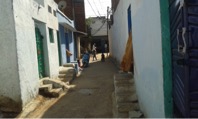
Saif lives in old city – predominantly a Muslim neighbourhood in Hyderabad – with his parents and four siblings in a small rented house.
On that day, we are discussing with Saif about changes he noticed at the personal and local level. Saif says there have been few changes in the place where he lives – a family has moved in to the front portion recently and another family moved in to the portion besides his home newly. So, there is a change in his play space. He used to play in front of one of the empty houses with his siblings and friends but he stopped playing there, as it would be a disturbance for the family now, he says.
At that point of time, a lady and her son just enter Saif’s house. Everything happened very quickly and fluidly. She didn’t even mind us being there. She just walked in to his house and sat with us. By then we were not sure who she was so we looked at her in surprise. Saif’s mom introduces her to us that she is a new tenant and she resides in the front portion. We say ‘hi’ to her and her son. In turn, she asks Saif’s mother about us in Urdu and Saif’s mom tells her about us briefly.
Then, the lady asks us ‘would you like to drink tea or coffee’. This puts Saif’s mother in an awkward situation. Saif’s mother responds to her neighbour saying that she always wanted to offer us something since the beginning but she had been hesitant to ask us (what we want). We tell Saif’s mom that we are happy for being not offered anything and we don’t want to give any trouble to her or to the family. She says it is not a trouble at all. She asks us what do we prefer to drink. Knowing the poor financial condition of the family, we tell her that we are happy to drink anything that she offers. She calls Saif inside to the kitchen and gives him the money and instruction to buy something for us. The session abruptly ends and Saif goes out. Its evident that Saif’s mother is compelled to offer us something by the innocuous act of her neighbour.
Then the lady from the front portion asks her son to speak with us in English. She tells us proudly that her son study in a private school and the medium of instruction in his school is English. ‘Speak with the teacher in English’ she tells her son assuming that we are teachers from a school. Saif and his elder sister attend a local government school where the medium of instruction is Hindi, so, her self-boasting irked Saif’s elder sister and she immediately rebukes ‘not teacher, doctor’. Madhavi says she is not a doctor though. The lady probes further about us. We tell her who we are. After a while, Saif comes back from a shop and his mom offers us a glass of coke. We sensed some dynamics emerging so we subtly diverted our focus on Saif’s Arabic class.
This kind of encounters with unsolicited strangers made our fieldwork challenging and interesting and also let us think deeply about its methodological and ethical ramifications.


